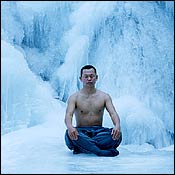
In the extraordinary Korean film Spring, Summer, Fall, Winter … and Spring, all the action takes place in the vicinity of a Buddhist monastery floating in a tree-lined lake that seems sealed off from the universe. The pastoral setting initially gives off intimations of deep repose—and dullness. But the film turns out to be far from placid. It’s about the terrors, as well as the beneficence, of the spiritual life, and its five sections are the seasons of a man’s life.
An old monk (revered theater actor Oh Young-soo) raises a young orphan (Kim Jong-ho) as his protégé. With no other children around, and no adults but his guardian, the boy busies himself with prayer rituals and cruel games that seem designed to break the monotony. He ties stones to a fish, a frog, and a snake, and giggles as they sink into oblivion. The monk quietly watches these games from afar and then, tying a stone to him, sends the boy off to unburden those creatures he harmed.
This sequence would not be out of place in one of the Grimms’ more grotesque fairy tales, but it also contains a troubling psychological truth: The child’s cruelties do not seem like the handiwork of an innocent scamp. The balm of prayer doesn’t really work for this boy because, on some deeply disturbing level, he is untouched by grace. Years later, when a distraught young woman (Ha Yeo-jin) is brought to the monk by her mother for salvation, the now-teenage boy (Seo Jae-kyung) is consumed by lust. Their carnal couplings, done in secret, are pure animal energy. The girl is returned to her senses, but her departure leaves the boy spiritually crazed—the life he has lived seems vapid by comparison. The monk, whose hoary features suggest he has also dwelled in the bitterness of the “real” world, warns the boy his passion for the woman is a dangerous thing to pursue, since if he covets something, so will others. His words have no effect, though, and the boy leaves the monastery. He returns as an adult, a fugitive, a killer, and the madness he exhibits is particularly horrifying in such sublime surroundings; it’s as if we were being told that perfect peace is not possible in this world.
“Kim sees the tooth and claw, and the transcendence.”
The two policemen who invade the sanctuary seem to have dropped in from another planet altogether, but for a time they too are caught up in the hushed solitude of the setting. The monk is worldly enough to accept their secular justice; he knows, and so does the fugitive, that there is no escape from the crime that has been committed, nor should there be. Alone again, the old man builds himself a funeral pyre, and for him this seems as natural as breathing. The writer-director, Kim Ki-duk, doesn’t try to soft-pedal the strangeness of his story; he knows that there is something repellent, as well as beatific, in the old monk’s self-abnegation. Kim himself appears, in the film’s final section, as the protégé, who has returned to the floating monastery. It is here that the story completes its cycle of seasons, with the introduction of a baby abandoned by a mother to his care. The circumstances of this abandonment are horrific, and yet the beauty of what we see stands out in all its stillness. Kim exalts nature—life’s passage—without stooping to sentimentality. He sees the tooth and claw, and he sees the transcendence. Whether this is a Buddhist attribute, I cannot say, but the impression this movie leaves is profound: Here is an artist who sees things whole.
Walking Tall is a remake in name only of the 1973 hit starring Joe Don Baker as real-life Buford Pusser, who cleaned up a corrupt southern town by wielding a big stick. The new film stars The Rock, but The Wood might be a better description of his performance. Returning to his on-the-skids boyhood town in the Pacific Northwest after a stint in the Army, the big guy battles corruption by swinging his pine log and getting himself elected sheriff. Maybe in the sequel, he can run for governor.